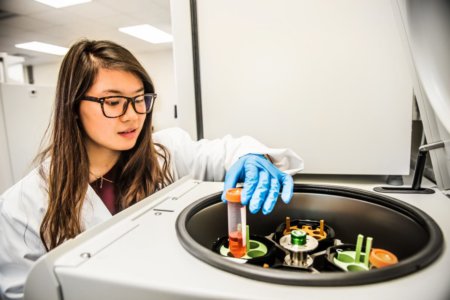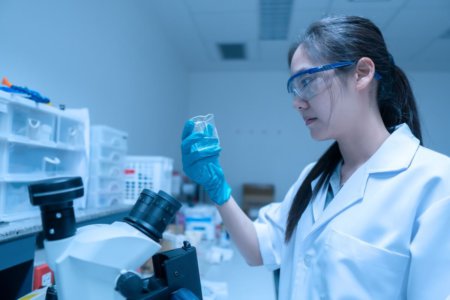Statistics show that hundreds of millions of people worldwide develop healthcare-acquired infections during their hospital stays each year. Megan Douglass, a doctoral candidate at the University of Georgia (UGA), is working towards reversing this trend.
Douglass, who is pursuing her doctorate in engineering with a biomedical emphasis, is part of a team under Hitesh Handa, an associate professor at the School of Chemical, Materials and Biomedical Engineering, who are helping to make hospital stays safer by designing next-generation medical devices that mitigate infection in hospital settings.
This includes developing liquid-repellent coatings for medical devices to keep patients from contracting potentially deadly infections. These coatings with superhydrophobic qualities prevent bacteria from multiplying on devices or surfaces, and may also have other applications.
“The majority of urinary tract infections, bloodstream infections, and pneumonia cases developed by critically ill patients are directly related to medical devices including urinary catheters, vascular catheters, and ventilators,” explained Douglass, who received the 2020 Baxter Young Investigator Award for her research. “In already health-compromised patients, an infection can severely impact the rate of recovery and survival.”
The work of Handa and Douglass is just an example of the type of life-changing research that the School’s scientists and researchers engage in every day.
The DNA for innovative engineering research
Aspiring graduate or doctoral engineering students who want to be part of a passionate group of researchers who push boundaries to address some of the world’s greatest challenges will experience all that and more at the School.
UGA is a public university nestled in Athens, a city that is consistently rated as one of the best college towns in the US. Athens is home to a vibrant music scene, distinctive local restaurants and shops, a thriving arts community, a bustling Victorian-era downtown, and numerous outdoor recreation options. UGA is also consistently rated as one of the nation’s best public universities.
Here, students have the opportunity to learn from leading academics in a tight-knit community. Their value-driven research ensures graduate students understand the social and economic impact of their work, have the skills to provide leadership in solving society’s greatest challenges and have opportunities to work on projects with students interested in diverse engineering areas.
Both undergraduate and graduate students can expect a demanding, high-quality education that emphasises experiential learning; the School doesn’t have traditional academic departments to ensure students’ education is interdisciplinary in nature.
The School sustains a reputation for offering demanding, high-quality programmes which include master’s programmes in biochemical engineering, biological engineering, and biomanufacturing and bioprocessing.
Their PhD in Engineering provides flexibility for students and faculty to address 21st-century problems, with options for students to focus in either a specific disciplinary specialty or interdisciplinary area.
Impactful research experience
Students who dream of pursuing research that addresses some of the world’s greatest challenges will find that there is no better place than UGA.
Here, faculty are at the frontiers of science and engineering, committed to research that addresses challenges in healthcare, along with issues related to sustainability and quality of life. Its commitment to foster a culture of innovation is characterised by the collaborative nature of their research and the bringing of multiple disciplines to the table.
Research here has a strong foundation in engineering that successfully integrates computer science, chemistry, microbiology, genetics and veterinary medicine, and many other scientific disciplines, reflecting the interdisciplinary nature of the college’s research.
The UGA faculty has acclaimed expertise in bio-based manufacturing, renewable energy and chemicals, sustainable new materials and next-generation advanced therapeutics and medical devices, making it highly attractive for aspiring researchers.
All of this makes for a unique research environment. As a comprehensive liberal arts research institution, the School is in prime position to collaborate with researchers in other disciplines across campus and worldwide. UGA’s distinctive qualities make it highly influential as a go-to place for graduate students.
Calcifying its position as an engineering research powerhouse
UGA’s researchers engage in a number of exciting projects, which includes building safer medical devices. Faculty members, including professors Jason Locklin and Jenna Jambeck, are committed to healthier materials for a sustainable bioeconomy. They have given expert commentary in leading news outlet The New York Times, where they debunk consumers’ common misconceptions about what “biodegradable” or “compostable” labels on product packaging mean.
Assistant professor Cheryl Gomillion’s tissue engineering research lab at UGA stands out for its diversity, thanks to her intentional and unintentional recruitment of underrepresented students. The National Science Foundation has awarded Gomillion a two-year, US$342,000 grant to explore ways in which graduate engineering research labs have successfully developed diversity.
Without a doubt, UGA provides the foundation for budding researchers to engage in research that tackles some of the world’s greatest challenges, making it a truly exciting place to be.













